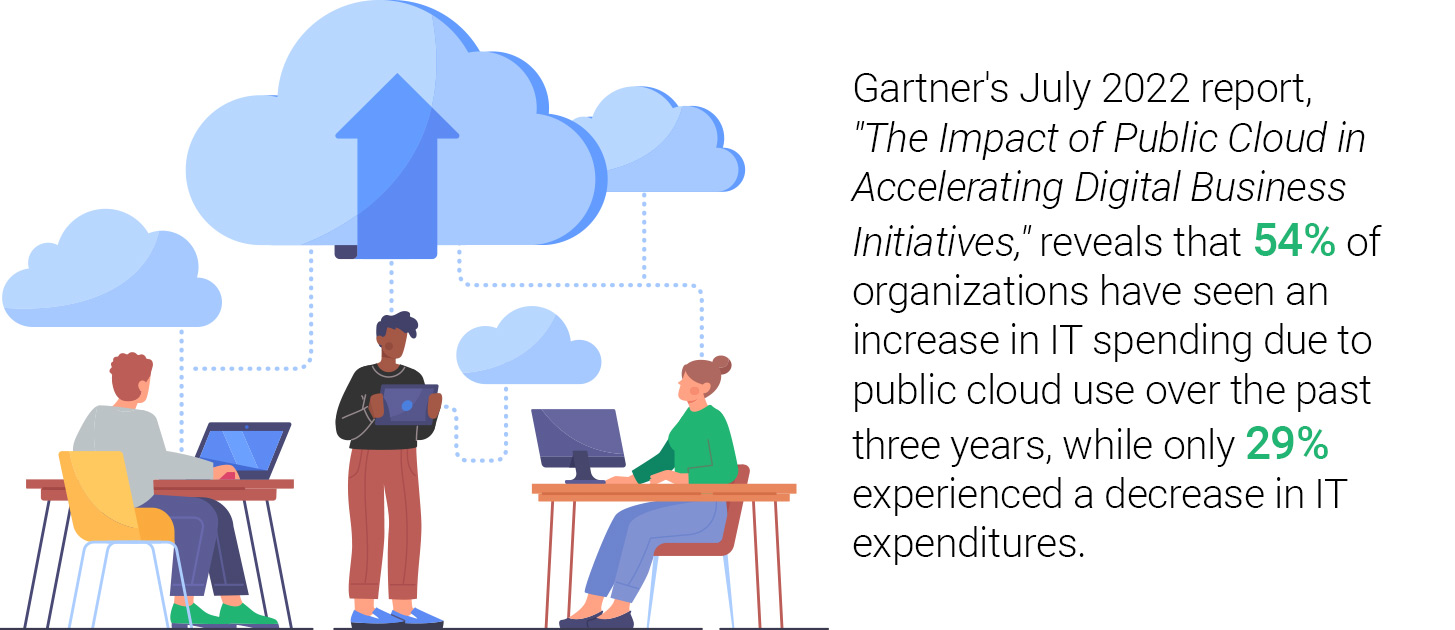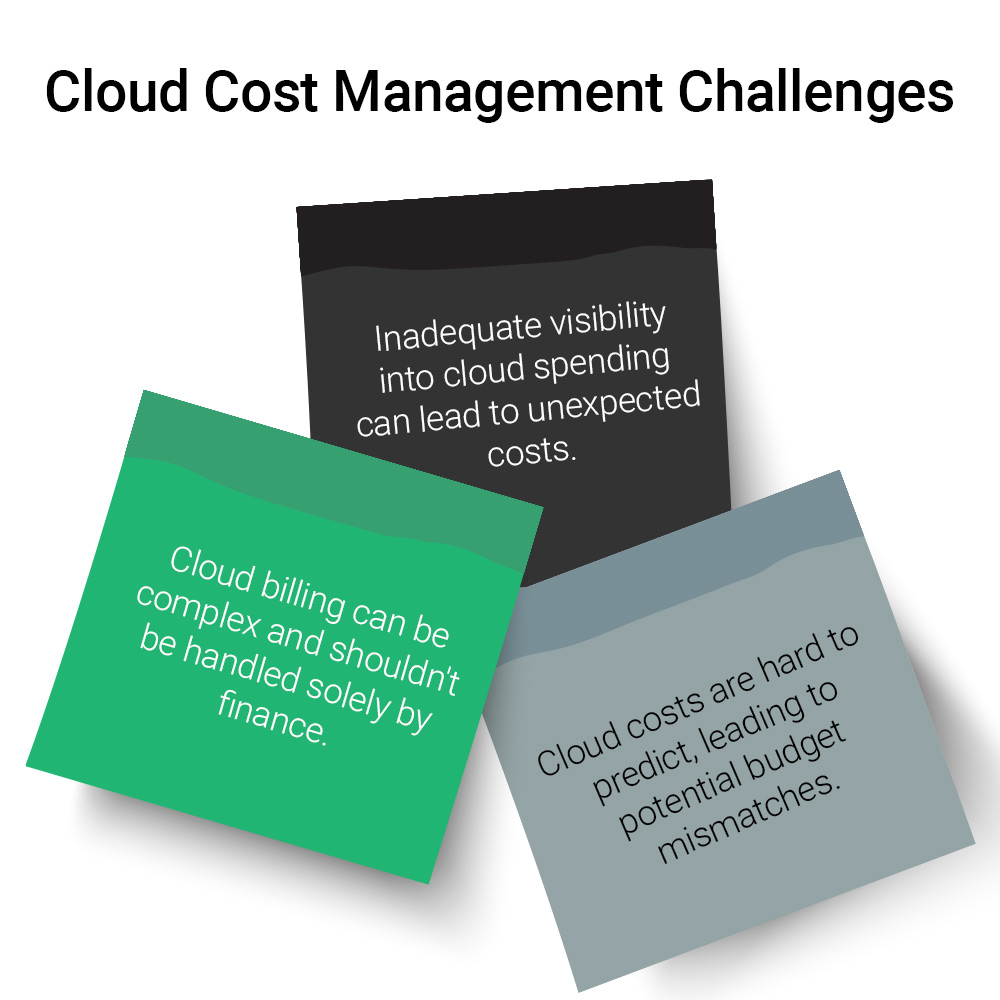
According to the latest "State of Cloud Cost Intelligence" report, a staggering 60% of organizations admit that their cloud costs exceed expectations by over 70%. This means cloud cost management has become a financial sinkhole for most businesses. The revelation underscores a widespread challenge—despite the rush to harness the power of cloud computing, companies are grappling with spiraling costs that often outpace their budgetary forecasts.
Projects, especially successful ones, are at the heart of effective cloud cost management. However, effective project planning is not innate to every project leader. Often, IT project leaders overlook stakeholder engagement, technical complexities, integration issues, and project estimation techniques while executing significant tasks in cloud environments. Overlooking these factors is invariably detrimental. Therefore, it is essential to acknowledge past oversights and enhance your approach to project planning.
So, how can you align your projects with business objectives, eliminate wasteful cloud spending, and enhance overall efficiency?
Artificial intelligence-driven project execution solutions further amplify this efficiency. These innovative tools leverage predictive analytics to predict and analyze cloud spending trends, recommend cost-saving measures, and automate monitoring and budget compliance. By integrating AI into the management of projects, as a business leader, you can achieve higher precision in their cloud cost optimization efforts, turning what once was a complex challenge into a manageable and even strategic component of their technological advancement.
In this article, we will explore the benefits and strategies of cloud cost management and how modern technology solutions like predictive analytics facilitate a more dynamic approach to sustainable cloud financial strategies.
What is Cloud Cost Management?
Cloud cost management, or cloud cost optimization, is the strategic process by which businesses track and control their cloud technology expenses to enhance usage and efficiency cost-effectively.
As cloud infrastructure grows in complexity, it becomes increasingly challenging to monitor expenses due to their less transparency. The prevalent "pay-as-you-go" pricing model that most public cloud services offer can lead to significant savings if managed well. However, without proper project oversight, there is a high risk of expenses escalating rapidly. This risk is amplified in environments where decision-making is distributed, and individuals can initiate projects that increase costs without sufficient oversight. So, what are the early indicators of a cloud project potentially going awry, and how can they be addressed before cloud cost overruns become inevitable?
The Challenges of Cloud Cost Management
A lack of a well-defined strategy, misalignment between cloud capabilities and business needs, project delays, and technical complexities often slow the cloud cost management journey. Furthermore, insufficient stakeholder engagement and concerns about security and compliance across migration, modernization, and operational domains can significantly impede progress.
In fact, according to a Harvard Business Review report, nearly 70% of digital transformation investments, including cloud transformations, could be wasted without clear strategies and an understanding of cloud value. The study highlights that implementing an effective cloud cost management strategy is indispensable for businesses to maximize their cloud infrastructure. How, you ask? We have got you covered.
Cloud Cost Management Strategies You Must Know
Several effective strategies exist for businesses to manage their cloud expenditures efficiently. These methods help in optimizing cloud investments while ensuring they align with organizational requirements:

- Right-Sizing: Select projects that precisely meet your organization's demands. As a business leader, you must proactively define your cloud cost management framework, focusing on key areas like project resource allocation, utilization, and waste reduction. Implementing a proactive framework helps your project leaders identify potential cost escalations before they become problematic.
- Implement Rigorous Cloud Cost Monitoring and Analytics: Effective monitoring and analytics give project leaders real-time insights into resource consumption, usage patterns, and associated costs. With AI-driven analytics solutions, you can automate the monitoring process and enable rapid identification of cost anomalies and opportunities for optimization. Further, this allows project teams to make informed decisions that keep costs in check.
- Leverage AI for Predictive Cost Insights: Your project leaders can accurately forecast future costs by harnessing historical data and machine learning algorithms. This predictive capability enables teams to anticipate cloud cost fluctuations, adjust budgets, and avoid unexpected overruns.
- Optimize Cloud Resource Allocation and Utilization: Inefficient use of cloud resources can lead to unnecessary project delays and budget overruns. AI-driven project solutions optimize resource allocation by analyzing project requirements, predicting workloads, and suggesting real-time resource adjustments. This helps ensure that cloud resources are used efficiently, reducing waste and minimizing costs.
- Integrate Cost Management into Project Governance: Establishing clear cloud cost management metrics, performance indicators, and accountability within the project team is essential. Automate governance processes, provide real-time visibility into project costs, and enable your project leaders to track progress against budgetary targets. This level of integration ensures that cloud cost management remains a top priority throughout the project lifecycle.
- Focus on Continuous Improvement and Learning: Ensure your project leaders regularly review cloud cost management, identify trends, and implement corrective actions when needed. Additionally, you must provide automated insights, suggest areas for improvement, and enable project teams to learn from past experiences through AI-driven project solutions. This commitment to continuous improvement ensures that cloud cost management remains dynamic and responsive to changing project needs.
 Managing portfolios of projects plays a critical role in cloud cost management as it involves detailed planning, budgeting, and resource allocation, which are essential for tracking and controlling cloud costs. But is the sole aim of cloud cost management merely to spend more wisely, or are there broader advantages that an organization can reap from it?
Managing portfolios of projects plays a critical role in cloud cost management as it involves detailed planning, budgeting, and resource allocation, which are essential for tracking and controlling cloud costs. But is the sole aim of cloud cost management merely to spend more wisely, or are there broader advantages that an organization can reap from it?
Hidden Benefits of Cloud Cost Management
Cloud computing presents significant benefits, such as enhanced scalability and avoiding large initial capital expenditures. These solutions empower your DevOps and IT teams to deploy services quickly and easily. Here’s an exploration of these advantages:
- Optimizing Cloud Expenditure: The primary advantage of effective cloud cost management is reducing unnecessary project expenses. Organizations that actively forecast and plan their projects and cloud expenditures with AI-driven solutions like predictive analytics can prevent overspending on underutilized resources.
- Resource Efficiency: By meticulously analyzing your cloud spending, you can minimize waste and optimize the utilization of their paid resources.
- Enhanced Performance: To manage cloud costs effectively, project leaders must select projects that perfectly match the organization's needs. Therefore, strategic project planning is critical to achieving optimal performance without incurring additional cloud expenses.
- Increased Visibility: Effective cloud cost management requires a comprehensive understanding of an organization’s cloud usage and infrastructure. This transparency facilitates cloud cost management and supports critical business functions like governance and security. Modern technological solutions provide detailed forecasts and trends based on existing data, enhancing decision-making processes across various facets of business operations.
Cloud cost management becomes essential if you shift more operations to the cloud. Conventional methods of managing expenses can be inadequate in such settings, where there are significant variations in resource allocation and consumption. Artificial intelligence-powered solutions play a critical role. McKinsey & Company highlights that businesses leveraging the cloud with real-time analytics see a 40% increase in the speed of bringing products to market. Could this be the key to unlocking the full potential of cloud investments while keeping costs in check? Let’s understand how AI’s ability to process vast amounts of data and predict future trends allows for a more nuanced and practical approach to cloud cost management.
The Future of Cloud Cost Management
Artificial intelligence and machine learning are revolutionizing how organizations handle cloud cost management, offering advanced solutions that significantly improve expense control.
The contributions of AI and ML to cloud cost management can be described as follows:
- Predictive Analysis: These technologies leverage historical data to spot potential project risks, allowing for accurate predictions of future budget, time, and resource needs. This is key in preventing over-provisioning, a frequent cause of increased costs.
- Anomaly Detection: AI and ML continuously oversee cloud usage and spending, swiftly identifying deviations. This advanced insight is vital for spotting inefficiencies or security concerns early.
- Automated Cost-Savings Recommendations: By providing recommendations based on data analysis, AI and ML help pinpoint underused project resources or suggest more cost-effective alternatives.
The potential for businesses to revolutionize their project execution processes through cloud transformation is vast. Still, mastery of cloud cost management will determine the sustainability and success of these initiatives. As you move forward, the importance of real-time insights, AI, and predictive intelligence will only become more pronounced.
What’s the Way Ahead?
As the digital landscape evolves, the imperative for robust cloud cost management strategies becomes undeniably critical. The "State of Cloud Cost Intelligence" report highlights that unchecked cloud expenditures can rapidly undermine business value. However, by adopting strategic approaches such as right-sizing, power scheduling, and leveraging AI-driven predictive analytics, you can align your cloud spending with business objectives, ensuring project execution excellence and budget adherence. Importantly, managing projects efficiently plays a pivotal role in this framework, providing a structured method to track, analyze, and optimize cloud usage across all levels of an organization. This, coupled with the advanced capabilities of artificial intelligence and machine learning, equips businesses with the tools to turn potential financial pitfalls into opportunities for growth and innovation.
If you are looking for one such tool that helps you improve your project health, look no further than TrueProject. TrueProject, a predictive intelligence solution for project health and performance, accurately predicts underlying issues that cause project failures before they manifest. The solution provides continuous oversight of each project through predictive early warnings while ensuring successful projects enhance your organization's competitiveness and contribute to successful cloud cost management.
Embracing these modern technologies and solutions not only enhances fiscal prudence but also propels companies toward achieving a competitive advantage in an increasingly digital marketplace.
 About the Author:
About the Author:
Nivedita Gopalakrishna is a content marketing specialist within the TrueProject Marketing team with extensive experience in blog writing and website content creation across diverse industries. Nivedita’s proficiency in crafting engaging blog posts and informative website content is a testament to her years of experience. Beyond her prowess in written communication, Nivedita has a knack for creating visually appealing static graphics that have played a pivotal role in expanding TrueProject's marketing efforts. Through thoughtful design choices, she has helped convey the essence of the brand and captivate audiences effectively. Outside the professional sphere, Nivedita is a trained classical singer and a fitness enthusiast, embodying creativity and wellness in and out of the office.
Endnotes:
- “Cloud Cost Analysis: A Comprehensive Guide.” Successive Digital. (n.d.). https://successive.tech/blog/cloud-cost-analysis-a-comprehensive-guide/
- Rivera, Sonny. “Cloud cost management: How to optimize and control cloud expenses.” ThoughtSpot. July 28, 2023. https://www.thoughtspot.com/data-trends/cloud/cloud-cost-management
- Team Cloud4C. “4 Hidden Benefits of Cloud Cost Management You Should Know.” Cloud4C. February 08, 2021. https://www.cloud4c.com/blogs/four-hidden-benefits-cloud-cost-management
- “What is cloud cost management?” VMware. (n.d.). https://www.vmware.com/topics/glossary/content/cloud-cost-management.html
- Shmuely Keren. “Cloud Cost Management: A Complete Guide.” Intel Granulate. 2023. https://granulate.io/blog/cloud-cost-management-key-models-and-tools-in-2023/
- “Cloud Cost Optimization: 10 Best Practices for FinOps.” Densify. (n.d.). https://www.densify.com/resources/cloud-cost-management-best-practices/





